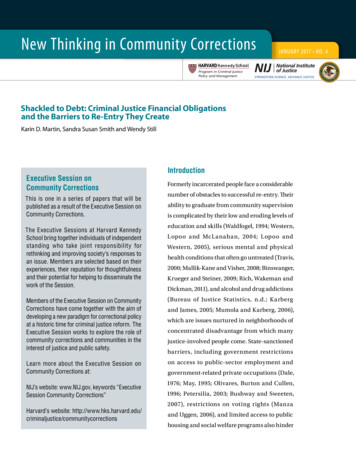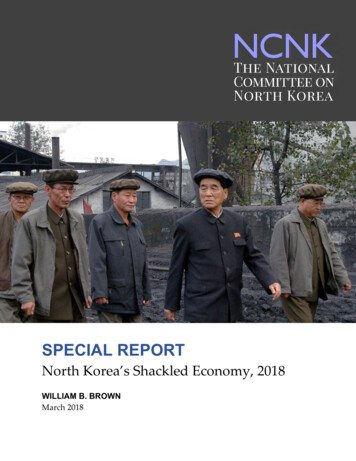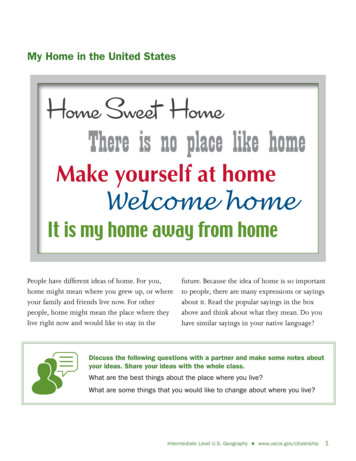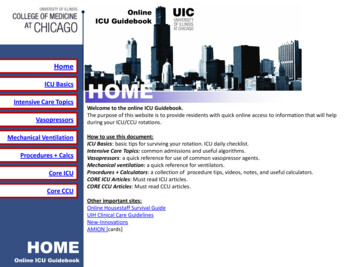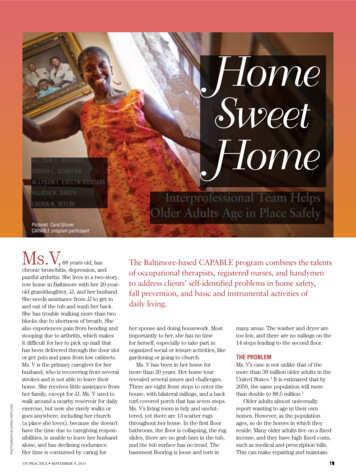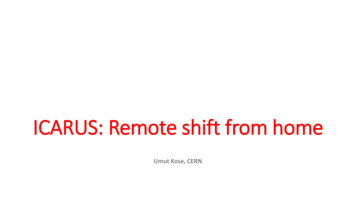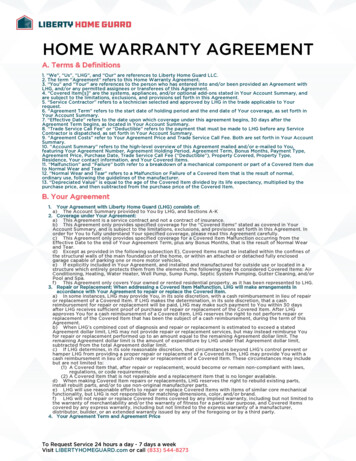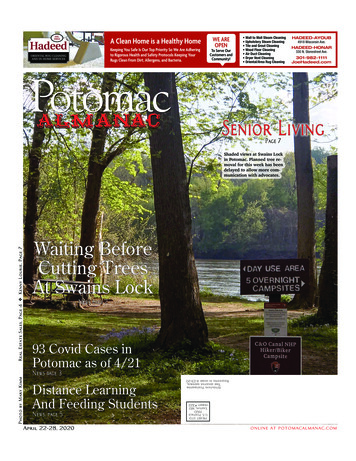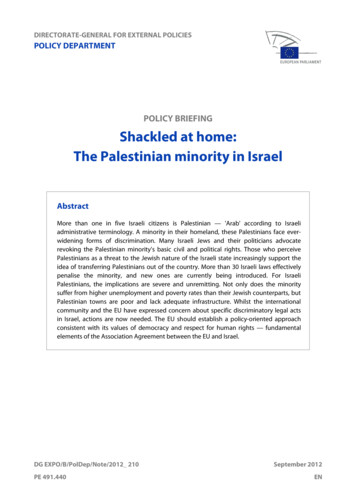
Transcription
DIRECTORATE-GENERAL FOR EXTERNAL POLICIESPOLICY DEPARTMENTPOLICY BRIEFINGShackled at home:The Palestinian minority in IsraelAbstractMore than one in five Israeli citizens is Palestinian — 'Arab' according to Israeliadministrative terminology. A minority in their homeland, these Palestinians face everwidening forms of discrimination. Many Israeli Jews and their politicians advocaterevoking the Palestinian minority's basic civil and political rights. Those who perceivePalestinians as a threat to the Jewish nature of the Israeli state increasingly support theidea of transferring Palestinians out of the country. More than 30 Israeli laws effectivelypenalise the minority, and new ones are currently being introduced. For IsraeliPalestinians, the implications are severe and unremitting. Not only does the minoritysuffer from higher unemployment and poverty rates than their Jewish counterparts, butPalestinian towns are poor and lack adequate infrastructure. Whilst the internationalcommunity and the EU have expressed concern about specific discriminatory legal actsin Israel, actions are now needed. The EU should establish a policy-oriented approachconsistent with its values of democracy and respect for human rights — fundamentalelements of the Association Agreement between the EU and Israel.DG EXPO/B/PolDep/Note/2012 210PE 491.440September 2012EN
Policy Department, Directorate-General for External PoliciesThis Policy Briefing is an initiative of the Policy Department, DG EXPO.AUTHORS:Dua' NAKHALA (under the supervision of Pekka HAKALA)Directorate-General for External Policies of the UnionPolicy DepartmentWIB 06 M 71rue Wiertz 60B-1047 BrusselsFeedback to pekka.hakala@europarl.europa.eu is welcome.Editorial Assistant: Agnieszka PUNZETLINGUISTIC VERSION:Original: ENABOUT THE PUBLISHER:Manuscript completed on 18 September 2012. European Union, 2012Printed inBelgiumThis Policy Briefing is available on the intranet site of the Directorate-General for External Policies, in theRegions and countries or Policy Areas section.To obtain paper copies, please send a request by e-mail to: poldep-expo@europarl.europa.eu.DISCLAIMER:Any opinions expressed in this document are the sole responsibility of the authors and do not necessarilyrepresent the official position of the European Parliament.Reproduction and translation, except for commercial purposes, are authorised, provided the source isacknowledged and provided the publisher is given prior notice and supplied with a copy of the publication.2
Shackled at home: The Palestinian Minority in IsraelTable of contents1Creating a minority41.11.2PalestinePalestinians in Israel442Describing Israeli Palestinians:73Legal status113.13.23.3111213CitizenshipCitizens' military servicePermanent residency4Discriminatory legal framework145Socio-economic issues216Demographics and the issue of 'transfer'257Political participation298Mutual distrust319Position of the international community349.19.29.39.434363737The European UnionThe United NationsThe United StatesHuman rights organisations10Policy options3811Sources403
Policy Department, Directorate-General for External Policies1Creating a minority1.1Palestine'Palestine' ( פלשתינה in Hebrew, ﻓﻠﺴﻄﻴﻦ in Arabic) is a geographicregion stretching from the Mediterranean Sea to the Jordan River,although its boundaries have varied throughout history 1 . Theregion is a crossroads of people and civilizations, and thecomposition of the local population and dominating power haschanged multiple times over the millennia. The same region iscalled the 'Holy Land' by Jews, Muslims and Christians, and the'Land of Israel' ('Eretz-Yisra'el', a term used in the Torah) by Jews.The region has received various additional labels in the course ofhistory, including Canaan, the Levant and Syria.Considered the birthplace of Judaism and Christianity, Palestine isalso home to some of Islam's holiest monuments. Despite thediversity of its population, the term 'Palestinian' is today generallyused to refer to people living in the region who speak Arabic('Arabs') and whose parents or grandparents lived in the part ofPalestine that was controlled by Great Britain from 1922 to 1948(the British Mandate of Palestine) and today defined as Israel, theWest Bank and the Gaza Strip.This paper addresses the issues faced by a subset of Palestinians:those living in the state of Israel. These Palestinians are Israelis whospeak Arabic as their first language, and they constitute Israel'sprincipal ethnic minority. This paper does not consider thequestion of Palestinians living beyond the borders of the Israelistate — those in the West Bank, Gaza or beyond. Nor is'Palestinian' here invoked to stake a claim to a greater (andunachieved) Palestinian statehood. While the people this paperdiscusses are described as 'Arab' by the Israeli administration,'Palestinian' is used here because it better accounts for theminority's historical link to the region. 'Arabs' also live in the Sudanor Algeria, while 'Palestinians' are linked specifically to Palestine .and therefore today also to Israel 2 .1.2Palestinians in IsraelPalestinians became a minority in Israel in 1948. While the Britishhad controlled Palestine since World War I, a war between Arabs1The first modern definition stems from the agreement made between France and Britainin 1922 and the Transjordan memorandum (1922), during the period when Britaincontrolled the territory under a mandate from the League of Nations.2More elaborate terms are also used in this paper: ‘Palestinians in Israel’, ‘the Palestinianminority’ Palestinians with Israeli citizenship / residency' or 'Israeli Palestinians'. When adifferent term is used in a citation, the original language is respected.4
Shackled at home: The Palestinian Minority in Israeland Jews in the region effectively divided the territory into threeparts, with a Jewish victory leading to the declaration of the state ofIsrael in the largest. The war also led to the displacement of thePalestinian population 3 . Some 771 000 Palestinians concentrated in19 refugee camps in the West Bank, and 1.1 million foundthemselves in 8 camps in the Gaza Strip 4 . Another 700 000 fled toneighbouring countries — Jordan, Lebanon, Syria, Egypt andbeyond — where they became refugees. These extraterritorialcamps, established more than six decades ago, still exist today,populated by the original refugees and their descendents. A total offive million Palestinian refugees are currently registered with theUnited Nations 5 .When the state of Israel wascreated in 1948, 160 000Palestinians remained and700 000 fled.Yet 160 000 6 Palestinians either remained on their land or fled toenclaves that today lie within Israel’s borders. These people, afraction of the original Palestinian population, formed the core ofPalestinian minority in Israel. These Israeli Palestinians — thoseliving within the borders of Israel, not in the West Bank or Gaza, who3While Israel marks 15 May 1948 as its independence day, Palestinians calls it 'Nakba'('catastrophe') and commemorate it every year.4The United Nations Relief and Works Agency (UNRWA) has detailed information on thestatus and current situation of the Palestinian refugees on their template.php?id 1035There are more than 2 million refugees living in 10 camps in Jordan, some 455 000 in 12camps in Lebanon and 486 000 in 12 camps in Syria.6http://www.crisisgroup.org/ ity-and-the-israeli-palestinianconflict.pdf7see the Law and Administration Ordinance (Amendment No. 11), 1967 at:http://www.mfa.gov.il/MFA/Foreign Relations/Israels Foreign Relations since 1947/1947-1974/13 Law and Administration Ordinance Amendment No.htm?WBCMODE PresentationUnp?DisplayMode print, Regulation ofLegal and Administrative Matters Ordinance of 1968 3522C85256403007DAED6 andsection 5 of the nationality law, 1952 ws/fulltext/nationalitylaw.htm8'The Concept of Indigenous Peoples.' Department of Economic and Social Affairs. TheUN. Publication ': PFII/2004/WS.1/3. New York, 19-21 January 2004.9See full text of the declaration D9E1D052565FA00705C6110See, for ttlements-hasn-t-changed-1.31849211Communication from the Commission to the Council and the European Parliament:'Reinvigorating EU actions on Human Rights and democratisation with Mediterraneanpartners - Strategic xUriServ.do?uri CELEX:52003DC0294:EN:NOT12An opinion poll conducted in November 2011 revealed that 52 % of Jews and 57 % ofthe Palestinians in Israel think that the two groups enjoy legal equality but faceinstitutional and societal discrimination. Of those polled, 7 % of the Israeli Jews and 36 %of the Palestinians in Israel described the Palestinian Israeli as living in an ‘apartheid state’.See: http://www.brookings.edu/reports/2011/1201 israel poll telhami.aspx.5
Policy Department, Directorate-General for External Policieshave Israeli citizenship— are the focus of this briefing.About 285 000 Palestiniansresiding in East Jerusalemare counted as residents ofIsrael.The Palestinian minorityconstitute an indigenousgroup, as described by theUN.In 1967, a substantial number of Palestinians were also incorporatedinto Israeli population counts after Israel occupied, then annexed,East Jerusalem. Although the city lies within the borders of occupiedPalestinian territory, Israel unilaterally declared Jerusalem its 'unitedeternal capital' in 1980. The approximately 285 000 Palestiniansresiding in the city are today considered permanent Israeli residents— though not citizens — and included in the national census 7 .While Palestinian Jerusalemites are not the focus of this paper, theyare affected by similar institutional and social discrimination facedby Palestinians with Israeli citizenship.Like Jews, Palestinians are indigenous to Israel. Yet the IsraeliPalestinians have involuntarily become a minority — defined bytheir historical origin (Palestinian), culture, language (Arabic) andreligion (generally Christian, Muslim or Druze) — in their homelandsince the establishment of Israel some 64 years ago. Although Israeldoes not recognise its Palestinian population as indigenous, thegroup meets the criteria of 'indigenous minority' as described byJosé Martínez Cobo, the Special Rapporteur to the UN SubCommission on Prevention of Discrimination and Protection ofMinorities:Indigenous communities, peoples and nations arethose which, having a historical continuity with preinvasion and pre-colonial societies that developed ontheir territories, consider themselves distinct fromother sectors of the societies now prevailing on thoseterritories, or parts of them. They form at present nondominant sectors of society and are determined topreserve, develop and transmit to future generationstheir ancestral territories, and their ethnic identity, asthe basis of their continued existence as people. 8For Palestinians, preserving their identity in Israel has been both achoice and an obligation. One of the most basic ideologicalchallenges stems from the definition of the 'Jewish nature' of Israel.For Palestinians — and indeed for many Jews as well — reconcilingthe 'Jewish State' with their identity as non-Jewish Israelis has beena thorny problem.The 'Jewish nature' of Israelhas been difficult for manyto accept.6The debate about the 'Jewish homeland' preceded theestablishment of Israel. A first Zionist conference was held in 1897 inBasel, where participants began lobbying US and Europeanpoliticians for the creation of a Jewish homeland in Palestine. In1917, the British Foreign Secretary, Earl Balfour, lent his support tothe project in an official letter known as the Balfour Declaration.The document confirmed that the British government 'view withfavour the establishment in Palestine of a national home for the
Shackled at home: The Palestinian Minority in IsraelJewish people.' The letter also added an important caveat: 'nothingshall be done which may prejudice the civil and religious' rights ofexisting non-Jewish communities in Palestine' 9 .Although Israel gained full membership at the United Nations afterproclaiming independence, the definition of Israel as a 'Jewishstate' has proved contentious within and outside the country. In1948, US President Harry Truman signed the document thatrecognized Israel's provisional government; a draft of declarationoriginally included the words 'the new Jewish State', but these wereamended to 'the State of Israel'. Since then, US State Departmentrepresentatives have referred to 'Israel's democracy as a Jewishstate' 10 . While the EU has never taken a position on the matter, a2003 communication from the European Commission described'the issue of reconciling the declared Jewish nature of the State ofIsrael with the rights of Israel's non-Jewish minorities' as an area inwhich 'Israel's compliance with internationally accepted standardsof Human Rights is not satisfactory' 11 . And for Israeli Palestinians, theproclaimed Jewish nature of the state effectively imposes politicaland ideological constraints.Today, Israel includes both Jewish and non-Jewish citizens. Morethan one in five Israelis is Palestinian. Yet many argue thatPalestinian citizens are not treated equally. The Palestinianminority’s 'second-class' status within Israel is a complaint frequentlyvoiced by Palestinians in Israel 12 .2Describing Israeli Palestinians:Names and categoriesThe Palestinian minority inIsrael forms 20.6 % of theIsraeli population. However,Israeli law does notrecognise this group as aminority.13As evoked at the outset, the denomination of the min
Shackled at home: The Palestinian minority in Israel . Abstract . More than one in five Israeli citizens is Palestinian — 'Arab' according to Israeli administrative terminology. A minority in their homeland, these Palestinians face ever-widening forms of discrimination. Many Israeli Jews and their politicians advocate revoking the Palestinian minority's basic civil and political rights .
